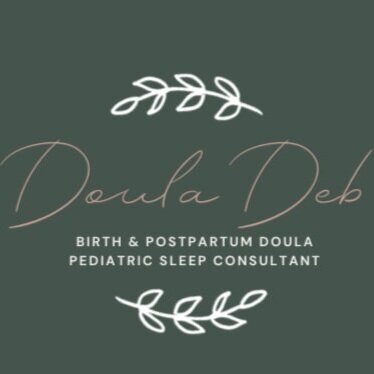When Worry Won’t Stop: Postpartum Anxiety & OCD Explained (Guests: Dr. Angie Maxwell, PT, DPT, WCS & Laura Meader, LICSW)
Listen to the Podcast!
You’ve got the baby registry filled out, the nursery nearly finished, or maybe you’re already a few weeks (or months) into life with your newborn. Either way, you’ve probably heard about the “baby blues” or maybe postpartum depression. But has anyone told you about postpartum anxiety or postpartum OCD?
If you’re pregnant and planning ahead, this is your heads-up. If you’re already postpartum and lying awake wondering, “Is this just me, or is something bigger going on?”, this is your sign to keep reading.
Because here’s the truth: anxiety and OCD in the postpartum period are common, but they’re also wildly misunderstood. And when you’re in the thick of it, it’s easy to feel like you’re the only one. Spoiler: you’re not.
Baby Blues vs. Postpartum Anxiety vs. Postpartum OCD
Let’s clear up the confusion right away:
Baby Blues: Up to 80% of new moms experience mood swings, tears, and overwhelm in the first two weeks postpartum. That’s usually hormones + exhaustion, and it fades on its own.
Postpartum Anxiety: This is more than just “new mom worry.” It looks like racing thoughts, constant fear that something bad will happen, irritability, restlessness, and never being able to actually relax, even when the baby is safe.
Postpartum OCD: This is where intrusive, often scary thoughts pop up (usually about your baby’s safety), and you feel compelled to act on them or avoid things to try and feel better. Think: checking baby’s breathing 50 times a night, or being terrified of stairs because you keep imagining dropping them.
The biggest difference? Baby blues pass quickly. Postpartum anxiety and OCD stick around, get in your way, and make life feel harder than it should.
Why Pregnant Moms Should Pay Attention Now
Pregnant and feeling fine? Amazing. But here’s why you should still care: planning for postpartum mental health is just as important as packing your hospital bag.
Risk factors for postpartum anxiety and OCD include:
A personal or family history of anxiety, depression, or OCD
Past trauma (birth-related or otherwise)
Sleep deprivation (yep, that’s every parent)
Limited support at home
High-stress environments or big life changes
The more you know now, the quicker you or your partner can recognize what’s happening and get help if needed.
Why Postpartum Moms Often Miss the Signs
Here’s the tricky part: a lot of postpartum moms brush off symptoms because they sound like “normal mom life.” But there’s a difference between being tired and being unable to sleep even when the baby sleeps. Between worrying a little and feeling consumed by fear. Between feeling annoyed and feeling rage bubbling under your skin.
If you’re already postpartum, ask yourself:
Do I feel like my brain won’t shut off, even when I desperately want to rest?
Am I having scary thoughts I don’t want and can’t control?
Does my body feel tense all the time, jaw clenched, shoulders tight, shallow breathing, even pelvic floor tension?
Am I constantly checking, rechecking, or avoiding things to “make sure” my baby is safe?
Have I lost joy in moments I expected to love?
If you’re nodding along, it’s worth talking to a provider.
How Anxiety and OCD Show Up in the Body
Mental health doesn’t live only in your head. It takes up real estate in your body, too. Pelvic floor physical therapists see postpartum anxiety every day: shallow chest breathing, jaw clenching, tight shoulders, and yes, even pelvic floor tension.
That tension can delay healing, make intimacy painful, and keep your nervous system stuck in “fight or flight.”
If you’re pregnant and already noticing stress patterns, or postpartum and feeling constantly on edge, know this: your body is giving you clues. Pay attention.
What You Can Do Right Now
If You’re Pregnant:
Have the conversation early - Talk with your partner or support team about mood changes and how you’ll check in with each other. Download the Postpartum Progress New Mom Checklist. It’s in everyday language and includes anxiety signs that other screenings miss.
Line Up Professional Support
A pelvic floor therapist can help you reconnect with your body, release tension, and recover physically in ways that support your emotional well-being.
A perinatal mental health therapist can help you work through intrusive thoughts, anxiety spirals, and trauma.
Build Your Village - Whether it’s a free community group like my Baby Lounge gatherings, or simply connecting with other moms at the same stage, community reduces isolation and normalizes what you’re going through.
Plan for Rest - Yes, newborns wake frequently, but that doesn’t mean you should never rest. Think about who can step in for naps, overnight help, or even a 20-minute walk outside.
If You’re Postpartum:
Check in with yourself. If your worry is constant, intrusive, or keeping you from resting, it’s time to reach out. Download the Postpartum Progress New Mom Checklist. It’s in everyday language and includes anxiety signs that other screenings miss.
Notice your body. Jaw, shoulders, pelvic floor, where are you holding stress? That’s a clue your nervous system needs help.
Find your people. Whether it’s a support group, a therapist, or my free Baby Lounge community gatherings, you don’t have to go through this alone.
Why Shame Keeps Moms Quiet
Here’s the heartbreaking part: so many moms never speak up because they feel ashamed. They think intrusive thoughts mean they’re “bad moms.” They think asking for help means they’ve failed.
Let’s get real:
Intrusive thoughts in postpartum OCD don’t mean you’ll act on them. They mean your brain is overwhelmed.
Asking for help doesn’t make you weak, it makes you wise.
Postpartum anxiety and OCD are treatable. The sooner you reach out, the sooner you’ll feel like yourself again.
The Big Picture
Whether you’re pregnant and planning ahead, or already postpartum and wondering why you can’t relax, here’s what you need to remember:
Postpartum anxiety and OCD are common and treatable.
Your body keeps the score. Pay attention to tension, breathing, and fatigue.
You are not alone. Communities, providers, and resources exist to support you.
Healing isn’t linear. Ignore the six-week clearance myth, recovery takes time, and your journey is unique.
And hey, if you’re already worrying that you won’t get it right, let me give you a freebie: there is no “right.” There is only your way, with support to help you feel steady as you learn and grow.
Because here’s the deal: you don’t have to white-knuckle your way through pregnancy or postpartum. The help is out there and you deserve it.
✨ Pregnancy is just the beginning. Let’s make sure your postpartum journey feels supported, realistic, and full of compassion, for both you and your baby.
Warmly,
Doula Deb
Ready for more?
👉 Join me at one of my free Baby Lounge community gatherings in Pierce County to connect with other parents.
👉 Grab the Postpartum Progress New Mom Checklist and keep it handy.
👉 Or, if you want one-on-one guidance, check out my postpartum and sleep support packages because you don’t have to do this alone.
Podcast Guests:
Laura Meader, LICSW
Crescent Moon Therapy
Laura is a licensed clinical social worker and therapist who loves providing therapy to women in Washington. She specializes in empowering perfectionists to overcome anxiety and self-doubt and build self-esteem, so they can live more authentic, confident, and fulfilling lives. A Midwesterner by birth (and lifelong loyalty to tater tots), she is proud to call the PNW her home for the better part of the last 7 years. She completed her graduate work at the University of Chicago and has practiced clinically in the Windy City and Puget Sound with Veterans, pregnant and parenting individuals, and across broad populations in medical and private practice settings.
When she’s not working, you'll find her reading, doing her best to hydrate, and spending time chasing her three kids and the sunlight. You can learn more about her and her private practice at her website.
Get in touch with Laura
Angie Maxwell, PT, DPT, WCS
Madrona Physical Therapy
Dr. Angie, owner and lead physical therapist, graduated from Eastern Washington University in 2013 with her Doctorate of Physical Therapy. She is a Board-Certified Clinical Specialist in Women’s Health Physical Therapy through the American Board of Physical Therapy Specialties, making her an expert in pelvic health for all genders and ages. Angie has worked in various hospitals and large practices before starting her own.
She opened her clinic to address the community's lack of support for pelvic health, particularly post-partum care and osteoporosis treatment. She is excited to create a clinic where individuals with pelvic health issues are cared for and receive specialized treatment.
With advanced training in pelvic floor dysfunction and related movement disorders from pregnancy to menopause, Angie utilizes a trauma-informed, holistic approach to alleviate pain and movement dysfunction. She lives in Lakewood, WA, with her husband, two children, and Australian labradoodle, Roxy. Her hobbies include yoga, hiking, reading, camping, cooking, boating, and dog training.



